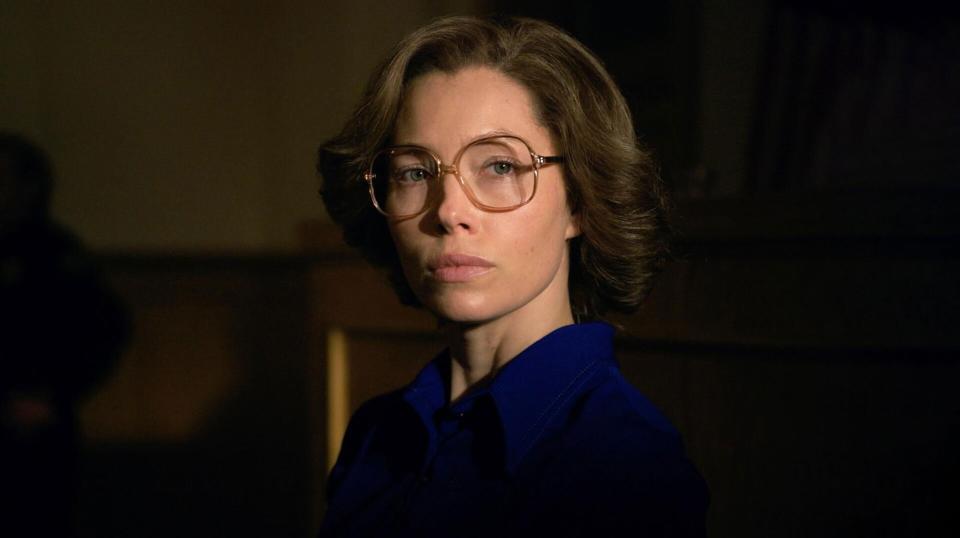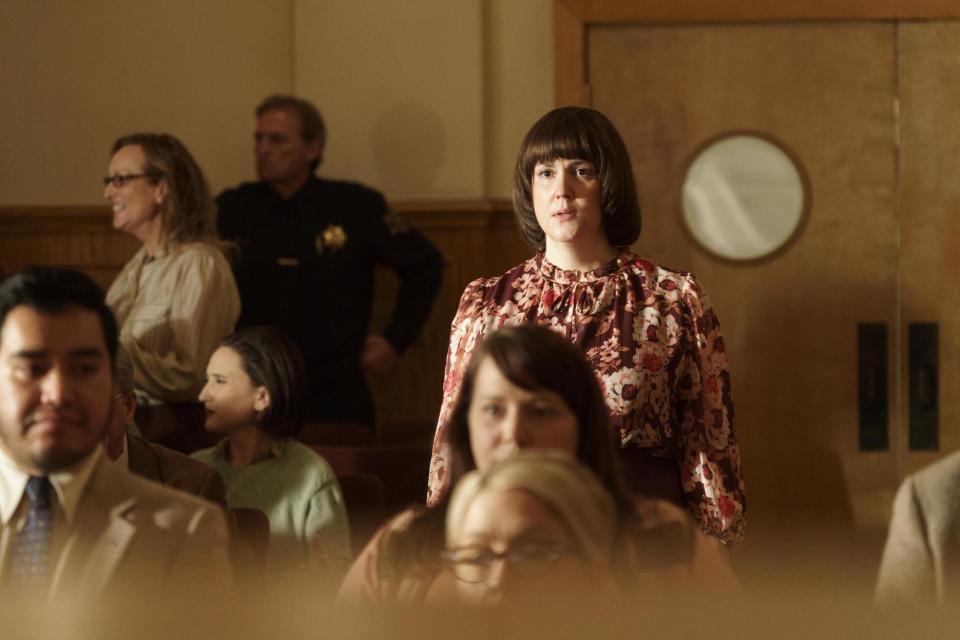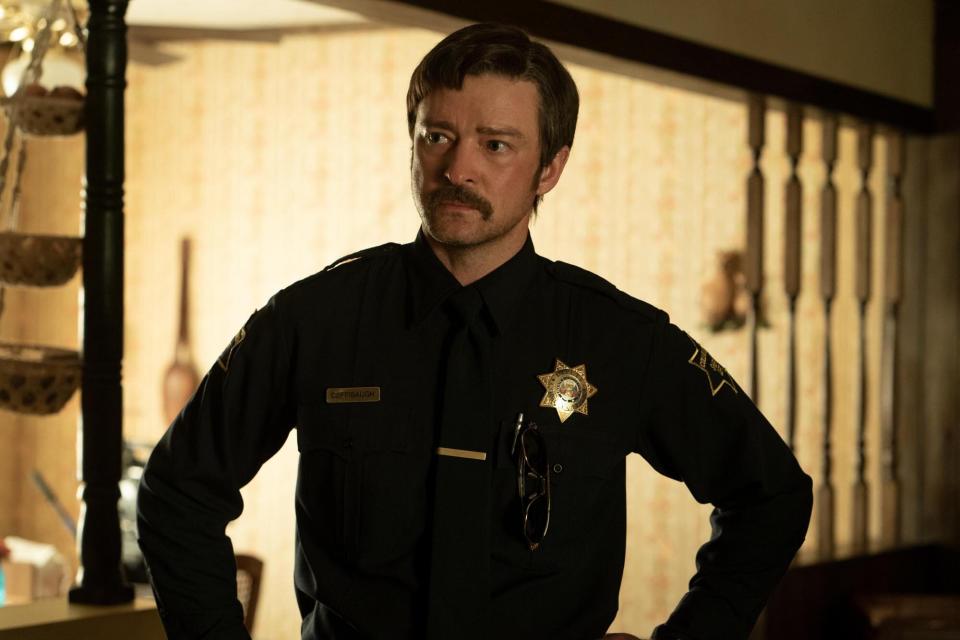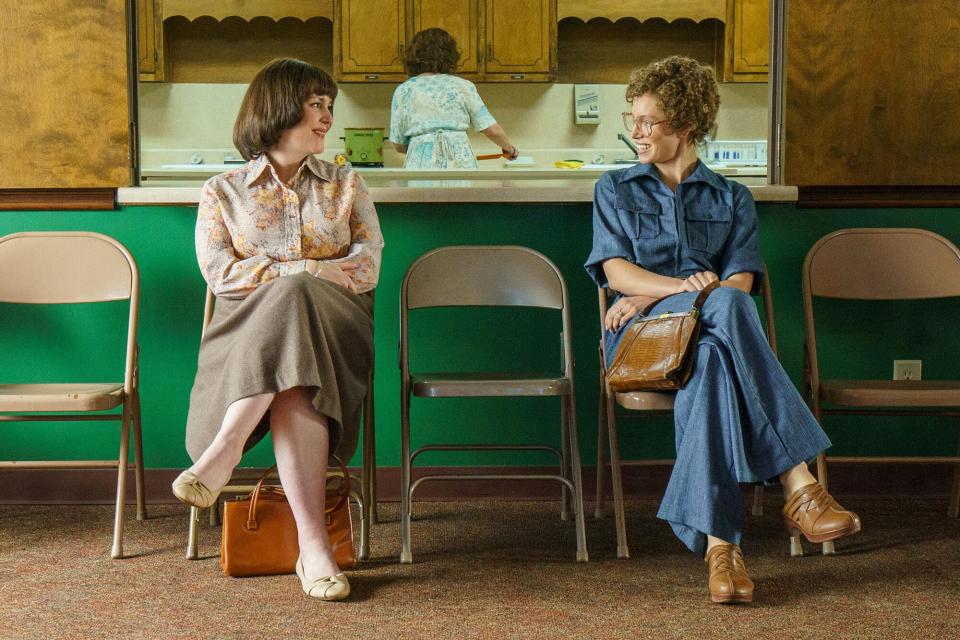Candy showrunner on surreal finale and why 'female rage' was integral to the true-crime series
Candy Montgomery (Jessica Biel) tells her story in the finale of Candy, Hulu's true-crime miniseries based on the titular housewife's gruesome murder of her friend Betty Gore (Melanie Lynskey).
In June 1980 (on Friday the 13th, no less), Montgomery paid a visit to Gore's home in the suburbs of Wylie, Texas, where Gore confronted her about an affair she had with her husband. Montgomery apologized for the affair, prompting Gore to shove her backwards into her utility room and reach for a nearby axe. A struggle occurred between the two. In an act of self defense, Montgomery fought against Gore, striking her with the axe 41 times.
At least, that's her side of the story.
Montgomery testified as much in a courtroom during her trial four months after the grisly event. Candy's finale features Montgomery's trial, where she was acquitted of murder (it also dramatizes Gore's gruesome killing). EW spoke with co-creator Robin Veith about the unnerving axe scene, Gore's surreal inclusion in the courtroom during the trial, that surprise Justin Timberlake cameo, and more.

Hulu Jessica Biel in 'Candy'
ENTERTAINMENT WEEKLY: Of course, you're no stranger to true crime, but what was it about this story that made you want to adapt it for TV?
ROBIN VEITH: When I first started looking into this story, it just reminded me so much of where I grew up. I was Candy's daughter's age in the 1980s. I grew up in a small suburban town that felt very much like Wylie, Texas, even though it was Kingsville, Maryland. But it was sort of the same idea of young couples who had sort of moved out into the 'burbs and all had children around the same time — this sort of small community that seems close knit. But there's always things bubbling underneath the surface when you're stranded out in the middle of nowhere.
It's interesting that the team opted to do five episodes premiering nightly in the age of streaming drops and whatnot. Was there deliberate reasoning behind this?
The cosmos seemed to point that this was the way to go in that there was a Friday the 13th right here for the taking. Friday the 13th is a key date in our story. Also, the one-[episode]-a-day event week was sort of like a hearken back to this time period, when you would have Shōgun and The Thorn Birds and Roots — which, that's what you're doing all week. It was like one a night for a week and you look forward to it.
Jessica Biel mentioned that she reached out to Candy's longtime representative and lawyer, as well as Evidence of Love: A True Story of Passion and Death in the Suburbs authors Jim Atkinson and Joe Bob Briggs. Can you tell me more about your research process? Did you contact anyone involved in the story?
We spoke to Robert Udashen, who was one of Candy's attorneys, numerous times; [he] was very informative. We also spoke to [detective] Steve Deffibaugh, Diffy, as you see him in the show, several times. He provided us with crime scene photos and coroners reports, medical examiners reports, all of his material. You mentioned Jim Atkinson, the reporter. We spoke to him numerous, numerous times, and Jim sent me a bunch of material that he had, including notes from Candy's hypnosis sessions. We had grand jury testimony. We had depositions. We had all of the court testimony. So it was just like thousands of pieces of paper, which for me was just heaven because I am a bit of a bibliophile. And to get this beautiful library box full of typewritten documents on onion skin [paper] was a great time for me.

Tina Rowden/Hulu Melanie Lynskey in 'Candy'
In all of these findings and documents, was there anything that didn't make it into the series that you wished had?
The thing that I wish I had a little bit more time for was, during the trial [and] the defense's presentation, they brought up some of the people from the community who were testifying that Betty could be really untoward and nasty. But the way that they would say things… one woman gave an example of how she gave Betty a gift and Betty just opened it, said thank you, then closed the box, and put it behind her. The woman thought that this was terrible, like this was nasty. I'm like, "You are disparaging a dead woman in court because she didn't say thank you in a way that you deemed appropriate?" So I wish we had time for that just to show that it's oversimplifying to think that Betty was an outcast and nasty. These people were terrible to her. And almost because she's better than them. She was more educated. She was more independent. I think that they just wanted this all to go away. Candy was this sort of cult of personality, so I think they'd rather have her be acquitted and [say] "Let's just all put this behind us and move on."
Let's get into the gruesome murder scene. Jessica and Melanie mentioned that the team teetered between "let's not show this" to "let's show it, it's part of this story." Can you speak more on that decision from a showrunner perspective?
When you do true crime, or really any story that involves real people, there's a tremendous responsibility that comes with that. When you film things, there tends to be this perception that just because you see it on screen, that's what actually happened. In this case, because we truly never can know what really happened, there was a lot of discussion between me and Jessica and Melanie about, "What should we show and what shouldn't we?," in terms of, "What are we saying to the audience?" Because it was very important to all of us and Michael Uppendahl, the director, as well. It was very important to all of us that we make it clear to the audience that you need to do the work here. We are not presenting this as fact. We're trying to honor the sides of the story as we have come to understand them with the information that we have. But that was sort of the balancing act we were trying to ride with: What do we show and what we don't show. Also, frankly, just not wanting to be exploitative and yet still showing this rage, which I felt was important to see, because it's something that I think for a long time society just pretends isn't there, is female rage.
I was struck by the decision to integrate Betty's spirit of sorts into the courtroom during Candy's trial. How and why did you land on this creative decision?
We came to it because I felt like, in all documented discussions of this case, the thing that's most discussed is Candy's version of the story. She's the one who got to tell the story. So throughout the trial and everything, it felt like something that we could do for Betty... [as] a reminder to the audience that there was a real woman involved. Let's not forget that. Candy gets to tell the story, [but] there is another side to it. The court case as it played out was interesting enough because this was before the time of performative lawyering, as we've come to know on television shows and everything of lawyers putting on a show with these eloquent speeches and everything. Don Crowder, Candy's attorney, was sort of a pioneer in that regard, in that he was a showman. The DA was sort of a dinosaur at the time in that he thought the letter of the law should just speak for itself. I believe the case went the way that it did, in part, because Don was just a better showman.

Tina Rowden/Hulu Justin Timberlake in 'Candy'
Let's go back to your Steve Deffibaugh (played by Justin Timberlake) reference earlier and address Justin's surprise cameo. Jessica said he essentially pitched himself, resulting in creative discussions. What did those discussions look like?
Nobody wanted to put me on the spot. So I think that there was a discussion of who was going to raise this to me. I went through several people, because in the sweetest way, they wanted to allow me to feel free to say no, which was a delicate thing. But Justin Timberlake is an insanely good actor. Why wouldn't I want an insanely good actor who's worked with some of the greatest directors [and starred in] some of the best films [to be] a guest star on my show? Why would I ever say no to that! It was basically like having a second dialect coach for free when we met and talked about it. He was like, "I know this guy. I know this guy." I'm like, "I bet you do, man."
Were there any discussions about why the role resonated so much for him?
I think just growing up in a small town in Tennessee. There was something about this guy — the way that he talked and everything. Justin just felt like, "I know who this guy is." He just felt really drawn to it. So much so that, without even having seen pictures of the real Steven [yet], he's like, "I can tell you what he looks like," and he was spot on!

Tina Rowden/Hulu Melanie Lynskey and Jessica Biel in 'Candy'
With Jessica and Melanie, they really disappear into their roles. Can you tell me more about the casting process and how you landed on these two?
It just felt like one of the luckiest weeks of my life. We sent the script to Jessica and she got back to us, I think, within 48 hours. We met with — we being me, my co-creator Nick Antosca and Mike Uppendahl, the pilot director — met with Jessica and Michelle Purple, her producing partner. Just hearing them talk about how they saw the show and how they saw Candy and everything, it's one of those dream scenarios where not only did she tell me what I was thinking, but made it like ten times better [and] expanded on it. That's exactly what you want in a creative partner and a collaborator. So, it's an exceptional day when you get Jessica Biel wholeheartedly onto your project. When we started talking about Betty, Hulu asked me early on in the process, "What kind of type do you think for Betty?" I'm like, "There's no type. It's Melanie Lynskey. The type is Melanie Lynskey and it's Melanie Lynskey." We just got lucky; she happened to be available. She had worked with Mike Uppendahl before on Castle Rock [and] loved working with Mike. We sent her the script. She agreed to do it. I was just like, "How is this happening? I'm going to get everything that I want."
Candy and Betty's story will be the subject of another series on HBO Max. What do you think makes this case so compelling, 42 years on?
I'm excited to see theirs when it comes out. There's so many ways to tell this story and it all comes from this sort of bygone era of no emails, no text, no video... there's no DNA evidence to really tell you definitively what happened. So I think that's why people keep coming back to it.
Also, we started on this in 2019 at sort of the height of #MeToo. Just this story of explosive female rage felt very apropos during that time, because it felt like we as women were finally being able to talk about things that we were told to never bring up or just [told to] get on with. So I sort of very much identified with that — of feeling so repressed about not being happy and not being allowed to say anything about it. Then as we started working on it and moving into 2020 and got into month two of lockdown, I was like, "Okay, now this is a story that's universal." I think everyone can identify with this story right now, where we're locked up in our houses. We have to do the right thing for society. We have to. And we're all going to do it. Of course we're going to do it. But if you asked me to do one more thing, I swear to God. So I think it's that. If I was pushed to my limit, I hope I don't pick up an axe. I don't think I would.
This interview has been edited and condensed for length and clarity.
All five episodes of Candy are now streaming on Hulu.
Sign up for Entertainment Weekly's free daily newsletter to get breaking TV news, exclusive first looks, recaps, reviews, interviews with your favorite stars, and more.
Related content:
Candy stars Jessica Biel and Melanie Lynskey break down explosive axe scene
Candy stars Jessica Biel and Melanie Lynskey on stepping into a real-life suburban horror story
Candy star Jessica Biel says husband Justin Timberlake's cameo was an 'accident'
Jessica Biel is the perfect housewife-turned-ax-murderer in the new Candy trailer

